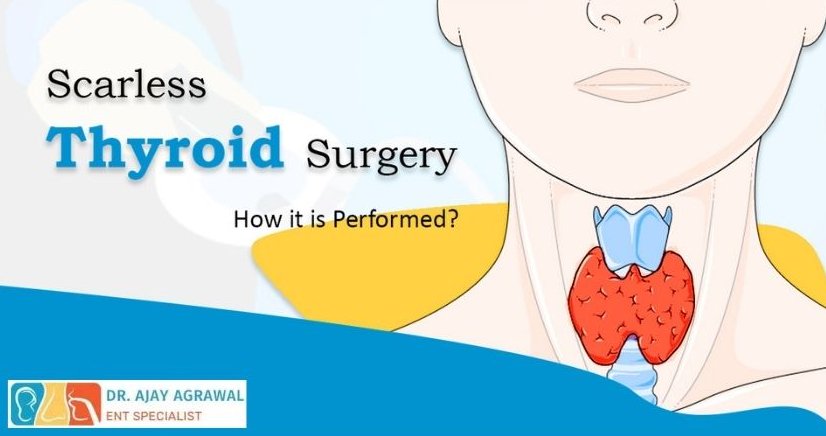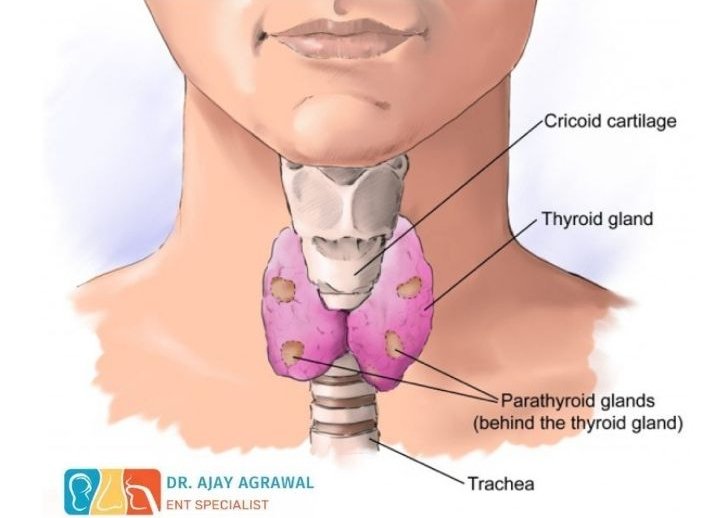Thyroid Surgery
Thyroidectomy: Surgical Removal of the Thyroid Gland
A thyroidectomy is a surgery that removes all or part of the thyroid gland, which is a butterfly-shaped gland at the base of your neck. This gland produces hormones that help regulate your metabolism, heart rate, and calorie burning. For expert care, see a top Thyroid Surgeon in Indore. Get the best thyroid surgery with a skilled Thyroid Surgeon in Indore.
Why Undergo Thyroidectomy?
Thyroidectomy is performed to treat various thyroid disorders, including:
- Thyroid Cancer: Removing cancerous thyroid tissue.
- Goiter: Treating non cancerous enlargement of the thyroid.
- Voice change (Hoarseness): Addressing an overactive thyroid.

Types of Thyroidectomy
The extent of thyroid removal depends on the underlying condition:
- Partial Thyroidectomy: Only part of the thyroid is removed. This may allow the thyroid to function normally after surgery.
- Total Thyroidectomy: The entire thyroid is removed. Patients will require daily thyroid hormone replacement therapy to mimic the thyroid’s natural function.
For those seeking expert care, Dr. Ajay Agarwal, the best ENT surgeon in Indore, specializes in thyroidectomy procedures. With his extensive experience and dedication, Dr. Agarwal ensures optimal outcomes and comprehensive post-surgical care.
Why it’s done
We recommend thyroid surgery treatment if you have the following conditions:
Thyroid Cancer
Cancer is the most common reason for thyroid surgery treatment. If you have thyroid infection, removing most or all of your thyroid is likely a necessary treatment option.
Noncancerous Enlargement of the Thyroid (Goiter)
If you have a large goiter that causes discomfort, difficulty breathing, or swallowing, or if it causes hyperthyroidism, removing all or part of your thyroid gland may be recommended.
Overactive Thyroid (Hyperthyroidism)
Hyperthyroidism is a condition where your thyroid gland produces too much thyroxine. If you experience problems with anti-thyroid drugs or prefer not to undergo radioactive iodine therapy, voice change (hoarseness) thyroid surgery treatment may be a suitable option.
Indeterminate or Suspicious Thyroid Nodules
Some thyroid nodules cannot be definitively identified as cancerous or noncancerous after a needle biopsy. If these nodules carry an increased risk of being cancerous, a thyroidectomy may be advised.
For those seeking expert care, Dr. Ajay Agarwal, the best thyroid surgery doctor in Indore, specializes in thyroidectomy procedures. With his extensive experience and dedication, Dr. Agarwal ensures optimal outcomes and comprehensive post-surgical care.
How you prepare
If you have hyperthyroidism, your doctor may prescribe medication, such as an iodine and potassium solution, to control your thyroid function and reduce the risk of swelling in the neck after surgery.
You will likely need to avoid eating and drinking for a specified period before surgery to prevent anesthesia complications. Your doctor will provide you with specific instructions regarding this.
Other Precautions
Before your scheduled thyroid surgery treatment, arrange for a friend or loved one to assist you in getting home after the procedure. Additionally, ensure you leave jewelry and valuables at home to avoid any complications.

What you can expect Before the procedure
Surgeons usually perform a thyroidectomy under general anesthesia, meaning you will be unconscious during the procedure. As part of this thyroid surgery treatment, the anesthesiologist or anesthetist will administer anesthesia either in the form of a gas to breathe through a mask or as a liquid injected into a vein. To aid your breathing during the surgery, a breathing tube will be inserted into your trachea.
To ensure your safety throughout the thyroid surgery treatment, the surgical team will attach several monitors to your body. These include a blood pressure cuff on your arm and heart-monitor leads on your chest to continuously track your heart rate, blood pressure, and blood oxygen levels.
For exceptional care in thyroid surgery treatment, trust Dr. Ajay Agarwal, the premier thyroid surgery doctor in Indore. Dr. Agarwal is dedicated to providing the highest level of patient care and achieving the best possible outcomes.
During the procedure
Once you’re unconscious, the surgeon makes an incision low in the center of your neck. This incision is often placed in a skin crease to minimize visibility after healing. Depending on the reason for the surgery, the surgeon will remove all or part of the thyroid gland.
If the thyroid surgery treatment is for thyroid cancer, the surgeon may also examine and remove lymph nodes around the swelling in the neck,. A thyroidectomy usually takes one to two hours, though the duration can vary based on the extent of the surgery needed.
There are several approaches to thyroid surgery treatment:
Conventional Thyroidectomy
This approach involves making an incision in the center of your neck to directly access the thyroid gland. Most patients are suitable candidates for this procedure.
Transoral Thyroidectomy
This method avoids a neck incision by using an incision inside the mouth.
Endoscopic Thyroidectomy
This technique uses smaller incisions in the neck. Surgical instruments and a small video camera are inserted through the incisions, with the camera guiding the surgeon through the procedure.
After the procedure
- After your thyroid surgery treatment, you’ll be moved to a recovery room for monitoring. Once fully conscious, you’ll go to a hospital room. Some patients may have a neck drain, typically removed the next morning.
- Neck pain and a hoarse or weak voice are common but usually temporary. These symptoms are often due to irritation from the breathing tube or nerve irritation from the surgery.
- You can eat and drink normally after surgery. Depending on your specific case, you might go home the same day or stay overnight. Avoid vigorous activities for 10 days to two weeks.
- The scar from surgery can take up to a year to fade. Using sunscreen can help minimize its visibility.
- For expert care in thyroid surgery treatment, consult Dr. Ajay Agarwal, the leading thyroid surgery doctor in Indore.
Results
Partial thyroidectomy
If only a portion of your thyroid is removed, the remaining part usually compensates for the function of the entire thyroid gland. Consequently, you may not require thyroid hormone therapy.
Complete thyroidectomy
When the entire thyroid is removed, your body cannot produce thyroid hormone naturally. Without replacement, you'll experience symptoms of underactive thyroid (hypothyroidism). Therefore, daily supplementation with a synthetic thyroid hormone like levothyroxine (Synthroid, Unithroid, etc.) becomes necessary.
This replacement hormone is identical to the one naturally produced by the thyroid gland and fulfills all its functions. Your doctor will regularly monitor your blood levels to determine the appropriate dosage of thyroid hormone replacement you require.
Frequently Asked Questions
Thyroidectomy may be necessary to treat conditions such as thyroid cancer, noncancerous enlargement of the thyroid (goiter), or overactive thyroid (hyperthyroidism).
There are several types of thyroidectomy, including partial thyroidectomy (removing part of the thyroid) and total thyroidectomy (removing the entire thyroid).
During a thyroidectomy, the surgeon makes an incision in the neck and removes the thyroid gland. Depending on the reason for surgery, nearby lymph nodes may also be examined and removed.
Risks of thyroid surgery include bleeding, infection, damage to nearby structures such as the vocal cords or parathyroid glands, and changes in voice or difficulty swallowing.
The scar from thyroid surgery may take up to a year to fade. Using sunscreen can help minimize its visibility.






